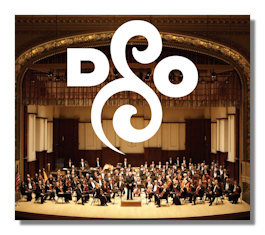
The Internet's Premier Classical Music Source
Related Links
- Latest Reviews
- More Reviews
-
By Composer
-
Collections
DVD & Blu-ray
Books
Concert Reviews
Articles/Interviews
Software
Audio
Search Amazon
Recommended Links
Site News
 Concert Review
Concert Review
Ludwig van Beethoven

The Symphonies, Program 1
- Leonore Overture #3 in C Major, Op. 72a (1806)
- Symphony #3 "Eroica" in E Flat Major, Op. 55 (1803)
- Symphony #8 in F Major, Op. 93 (1812)
Detroit Symphony Orchestra/Leonard Slatkin
Orchestra Hall, Detroit, Michigan, 8 February 2013
A crowd of nearly 2,000 packed Orchestra Hall in Detroit to kick off the Detroit Symphony's first Beethoven festival in 36 years. A quick glance at ArkivMusic shows a surprising stat; Maestro Slatkin has no available Beethoven recordings to his name. The orchestra has also made its name elsewhere, largely in French music under Paul Paray, and in American and Russian works under Antal Doráti and Neeme Järvi. However, the Detroit Symphony and Orchestra Hall remain one of music's best kept secrets, a magnificent acoustic space filled with top-grade musicians.
In his letter to patrons inside the program, Music Director Slatkin promised to embrace both modern scholarship and past traditions. Thus for these concerts, the strings were split as they would be in Beethoven's time. Conversely, the conductor chose the latest in modern editions. In a hall where everything can be heard, both the old and the new made – and will continue to make – a good deal of difference. Tempos promise to be swift, the "lesser" symphonies will feature smaller ensemble size, and some sections indeed sounded quite foreign. But that's the beauty of Beethoven, it should always sound revolutionary.
By the time this evening program began, the orchestra had already completed the same set of works early that morning, broadcast globally as part of the orchestra's webcast program. Still, there was a sense of occasion this evening that made it feel like the festival's first concert. The opening Leonore overture was neither slow nor blistering, but featured some marvelous solo playing from the first-chair players. Slatkin's attention to detail and dynamics kept everything flowing, and by the middle of the overture, the orchestra was clearly fired up, bringing the work to an exciting conclusion. The audience response showed a great deal of enthusiasm, and the ovation was far exceeding that morning's reception. There was a buzz around the hall.
As a symphonic interpreter, Slatkin is not a conductor known for extremes of tempo, nor is he known for cultivating a unique "sound". Rather, he was and remains a charismatic, intelligent, communicator and orchestral trainer. He works with the sound he's given, and within a solid framework that doesn't draw attention to itself. At his best, the results are spontaneous and satisfying. At worst, he can be a touch rigid and dry. So it was great to see everyone on top form in the two symphonies. As with the overture, it took a few minutes into the Symphony #8 for the orchestra to warm up, but once they did the performance was excellent. Often seen as a sunny, yet minor work, here the dramatic tension was evident and exciting. Orchestra and conductor switched moods on a dime, and combined with swift but never rushed tempos, as a whole the piece was entirely convincing. Beautifully crisp wind solos that had no problem cutting through textures rounded out a first half that was fully appreciated by the audience.
In the Eroica, great playing and total commitment goes a long way. Slatkin and the Detroit Symphony delivered a very fine performance that brought down the house. Again, the wind playing was simply excellent. Slatkin – who conducted the entire program without a score – again proved a master of dramatic transitions and dynamic tension. The first movement was incredibly exciting. The following funeral march was spine tingling, and while not erasing my memories of favorite recordings, was nonetheless intense and fit with the interpretation. The scherzo featured some of the best playing I have heard from the orchestra in a few years, full of quicksilver runs and more delightful wind solos. By the time the finale rolled around, the strings were in really fine form. The coda was not the most physically exciting I'd ever heard, but was stunningly played. The applause was long and many bows were taken. All 2,000 patrons were on their feet, and even the musicians seemed to know they had participated in an event.
The next few weeks will feature the remaining seven Beethoven symphonies, and if tonight was any indication, they should please, shock, and confuse just as they have done since being written. Classical music fans here in Detroit have been very excited for this festival, and rightfully so. The fabled backdrop of Orchestra Hall provides the ideal canvas on which Slatkin and the Detroit Symphony can paint. I eagerly look forward to more.
Copyright © 2013, Brian Wigman












